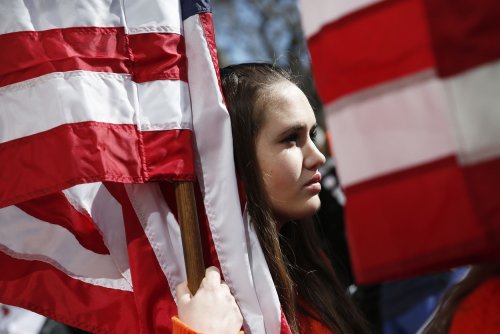CHICAGO, July 29 (UPI) -- The federal government has called an unprecedented meeting of U.S. airlines next week in Washington to reduce congestion that has worsened delays at Chicago's O'Hare International Airport.
Chicago historically has been a transportation crossroads since its founding, first with shipping, then railroads, highways and later the airlines.
American Airlines and United Airlines, which have connecting hubs that account for more than 80 percent of flights at O'Hare, the nation's busiest airport, have agreed to two rounds of flight cuts this year. O'Hare has the poorest on-time flight performance of any U.S. airport.
Both airlines reduced prime-time flights 5 percent -- a total of 62 daily flights -- in March between the peak hours of 1 p.m. and 8 p.m., and another 2.5 percent in June, but the voluntary cuts expire Oct. 31.
Other airlines scheduled new flights in time periods during which United and American trimmed their schedules. Independence Air, a 6-week-old low-fare carrier, added 12 prime-time flights in slots vacated by United and American.
There were a record 14,495 flight delays in May at O'Hare, some because of severe weather and spring storms. Delays improved slightly in June with 69 percent on-time arrivals, but summer congestion is not getting any better.
O'Hare had 58,600 delayed flights through June, more than the full-year totals in 2000, 2001 and 2002. O'Hare is the nation's busiest airport in the number of flights. Atlanta's Hartsfield International Airport handles more passengers.
The situation has been so bad this summer many frequent fliers try to route their travel to avoid changing planes at O'Hare -- but that won't solve the problem since backups and delays in Chicago have a ripple effect for air traffic across the country.
Daily arrival delays at the nation's top 35 airports have increased an average of nearly 25 percent. FAA computer modeling places the blame for a significant portion of the delays on O'Hare.
U.S. Transportation Secretary Norman Mineta calls the situation "untenable."
"We cannot permit O'Hare congestion to ground an economy and aviation system that are both roaring back," Mineta said Wednesday. "O'Hare's on-time performance is unacceptable and has a substantial ripple effect on our nation's aviation system. It is critical that all O'Hare carriers set schedules that better match the airport's current capacity and keep passengers moving."
The meeting of all domestic U.S. airlines will take place Wednesday at the headquarters of the Federal Aviation Administration to talk about how to reduce delays between 6 a.m. and 11 p.m.
If no consensus is reached, the FAA has the power to force the carriers to reduce their flight schedules to achieve "an important public benefit." Congress passed Vision 1000 in November to authorize the transportation secretary to ask the airlines to reduce scheduling at severely overcrowded airports.
The Chicago Department of Aviation, the agency that runs O'Hare, was invited to the meeting to discuss a proposed $15 billion runway-expansion plan.
"The long-term solution for O'Hare is to add more capacity, and we are moving full-speed ahead to evaluate the city of Chicago's proposed modernization plans and its environmental impact," said FAA Administrator Marion C. Blakey. "O'Hare's recent on-time performance, however, clearly tells us the airport needs relief. As we have said repeatedly, we want to work closely with the airlines to find interim solutions that return us to more reasonable schedules."
The FAA will break the flight schedule into 15-minute increments to show the airlines which periods are most congested and then announce flight target levels.
"We need to get everybody to the table to understand that congestion at O'Hare is not good for everybody and that all of them need to share the pain," Chicago Aviation Commissioner John Roberson told the Chicago Tribune.
Blakey, who will be chairwoman for the roundtable, will huddle with carriers privately to hear their solutions. She can keep going back to negotiate until the delays ease. The FAA can order emergency restrictions for a six-month period beginning in November if the airlines don't voluntarily comply.
"I have a high degree of confidence this meeting can succeed if everyone comes to it with the right degree of focus, and with a real understanding of what the numbers on delays really tell us," Blakey said on a conference call. "I think that we feel that we have had good results broadly ... with voluntary cooperation, so that is the approach we are taking right now."
Airlines at O'Hare schedule up to 120 arrivals per hour during peak periods, 20 more than the FAA feels should be accommodated. The airport often handles more than 2,900 daily flights, according to data complied by the Bureau of Transportation Statistics.
"What's happening at O'Hare is an insult to airline customers and an assault on air-travel schedules across the country," said Sen. Peter Fitzgerald, R-Ill., who called for flight caps Thursday. "The airlines regularly schedule more flights than O'Hare is able to handle and then blame the inevitable delays on the weather or the FAA."
O'Hare operated under mandatory flight caps for more than 30 years before all flight caps were phased out in 2002. Air-traffic controllers in the Chicago area have been pushing for flight curbs and blame an increase in controller errors on the congestion.
"Something has got to be done. Right now, what we have to deal with is overwhelming ... they have to spread out their schedules to give us a fighting chance," Craig Burzych, president of the National Air Traffic Controllers Association branch at O'Hare's control tower, told the Chicago Sun-Times.
The controllers union was not invited to the meeting.
--
(Please send comments to [email protected].)














